Articles Menu
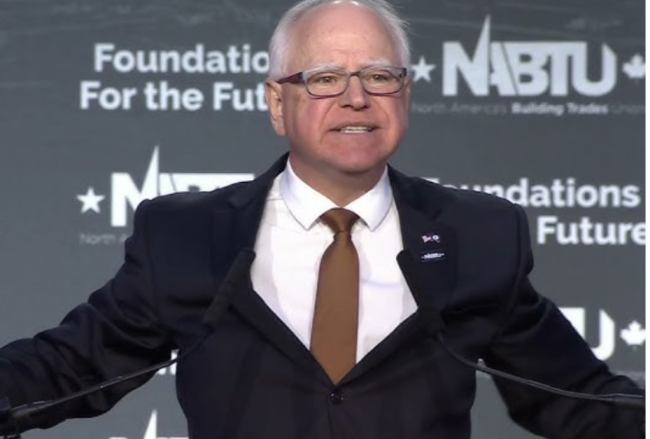
Aug. 23, 2024
This week, Minnesota Governor Tim Walz was officially endorsed as the 2024 Democratic Party nominee for Vice President at the Democratic National Convention. Since being named the VP pick by the Harris campaign, Walz has received extensive praise for his military background and ‘folksy’ personality (read: midwestern white male); and for his accomplishments as Minnesota Governor, including signing bills that provide free school lunches for children, and set a 100% carbon-free electricity standard. Social media has exploded with memes positioning Walz as a Midwestern folk hero, that dad who “puts $20 in your back pocket so you won’t run out of gas,” or drops everything to dig your car out of a snowbank. Media outlets and nationally known left-leaning activists and commentators have fully embraced this narrative around Walz. As it turns out, Governor Walz and his team have been carefully cultivating this media narrative for nearly two years, the deployment of a long and strategic political calculus befitting of someone who clearly harbors major political ambitions.
For those of us who have had a front row seat to some of Walz’s machinations and political decision-making in Minnesota for the past several years, reconciling the current media narrative around Walz with what we’ve seen with our own eyes has been disorienting. For our own part, we are scientists who frequently came up against the Walz administration as we worked to join the broad and Indigenous-led movement to stop “Line 3”, an enormous tar sands oil pipeline owned by the fossil fuel giant Enbridge that now runs through 300 miles of sensitive northern ecosystems and sovereign treaty territories of Indigenous people in Minnesota. Tar sands oil is some of the dirtiest fuel on the planet; greenhouse gas emissions from the oil running through Line 3 is equivalent to that of 50 coal plants annually, more than the entire state of Minnesota emits alone. This pipeline crosses the headwaters of the Mississippi River, and oil spilled from the pipeline would devastate native flora and fauna, including wild rice, a threatened and sacred food of the Ojibwe people in Minnesota. In the heat of the current political climate, as Tim Walz is being highlighted by some as a “climate champion” and a “true progressive,” our years fighting his administration’s approval of this pipeline leaves us with quite a different understanding of his political choices and gamesmanship.
His actions also influence our perspective on Walz during his first Gubernatorial campaign, his responses during the uprising of 2020 following the murder of George Floyd by police in Minneapolis and in 2021 following the murder of Daunte Wright by police in Brooklyn Center, Minnesota, as well as his role in the progressive legislative agenda recently enacted at the Minnesota state capitol.
Tim Walz originally decided to run for office as a Democrat after being denied entry to a George W. Bush rally in 2004. He flipped a longtime red Congressional District in 2006, and then proceeded to be one of the most conservative Democrats in the U.S. Congress, ironically aligning himself with many of the Bush Administration policies. He had an ‘A’ rating from the NRA, voted for the Keystone XL tar sands oil pipeline, supported the big agriculture industry, and was obviously pro-military after serving in the Minnesota National Guard for 24 years.
When Walz ran for Governor in 2018, he was facing several progressive challengers within the Democratic party including current Minnesota Senate Majority Leader and former director of the Minnesota Nurses Union, Erin Murphy. To win the party endorsement (first losing in the convention nomination process, and then going on to win in the primary election), Walz started to lean more progressive, asking White Earth Band of Ojibwe member Peggy Flanagan to join his ticket to up his credibility. During the run-up to his campaign for Governor, Walz began to make statements about Line 3. Initially, he claimed to strongly oppose the pipeline, saying it was a “non-starter.”
After winning the election, Walz became increasingly noncommittal on Line 3. Facing strong pressure from Indigenous and environmental groups immediately after he won the election, the Walz Administration initially decided to support a legal challenge to the pipeline originally filed by the previous Dayton Administration. However, Walz began to make vague promises that decisions about the pipeline should “follow the science” and “follow the process”. As scientists who were part of a broad social movement for climate justice, we were clear that climate science, economics and treaty law indicated there was absolutely no justification for new expansion of tar sands oil pipelines through indigenous treaty territory. However, when a second opportunity arose to continue ongoing legal challenges against the pipeline, the Walz Administration declined to participate, subsequently, it made decision after decision that ultimately led to the pipeline’s approval.
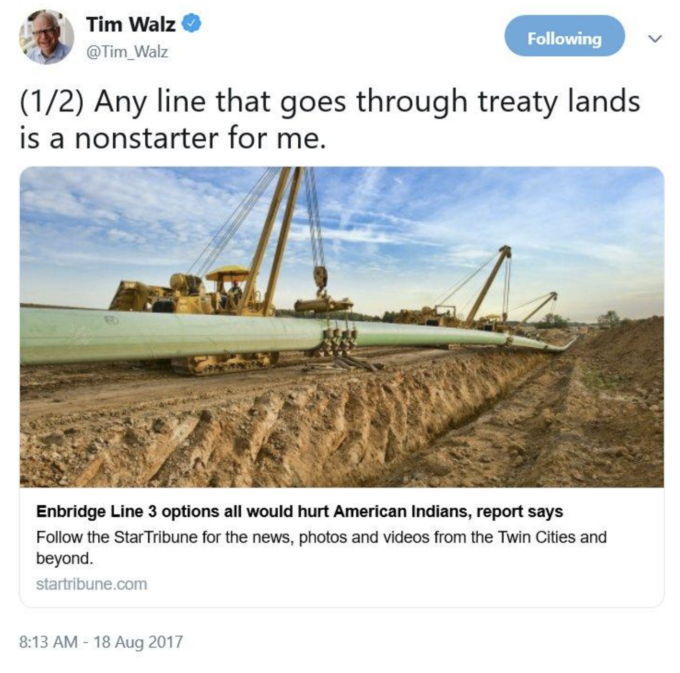
Once elected, Governor Walz appointed the Commissioners of the Minnesota Pollution Control Agency (MPCA), the Minnesota Department of Natural Resources (DNR), and the Minnesota Public Utilities Commissions (PUC), agencies that played pivotal roles in regulatory decisions that led to pipeline approval. Several of these commissioners had corporate or pro-industry backgrounds. For example, Walz’s appointment to the Minnesota Pollution Control Agency, the primary environmental regulatory agency in the state, was former Best Buy CEO and major Democratic party donor Laura Bishop. All three state agencies went on to issue permits for Enbridge to allow for the construction of Line 3. In protest, a supermajority of the MPCA’s recently formed Environmental Justice Committee – citizens tasked with advising the agency on environmental justice policies and outcomes – resigned, citing their refusal to “legitimize and provide cover for the MPCA’s war on black and brown people.”
The Walz-appointed Commissioners would later play a ‘hot potato’ blame game to shirk responsibility for their devastating decision to approve the pipeline, each claiming that agencies other than their own were responsible for key decisions that led to pipeline approval. Their ringleader, by this time known to the pipeline resistance movement as ‘Tar Sands Tim’ Walz, always avoided any questions about this. Walz also actively refused to use any executive power to stop the pipeline, arguing that such a move would be overstepping his executive authority.
Governor Walz also appointed Republican John Tuma to the Public Utilities Commission, one of the primary agencies with regulatory oversight over the pipeline. While approving Line 3, the PUC required Enbridge to reimburse law enforcement agencies for all expenses incurred while policing protests against the pipeline. Tuma stated that the “whole idea came to me thanks to Enbridge.” During construction of Line 3 in 2020-2021, nearly 100 different law enforcement agencies from around Minnesota received a combined $8.6M from Enbridge. They made over 1000 arrests of protestors who were peacefully opposing the pipeline. While making these arrests, law enforcement deployed physical violence, chemical weapons, ‘pain compliance’ torture techniques, LRAD noise devices, K9 units, and had a border patrol helicopter descend on a protest of over one thousand, rotor washing everyone in potentially harmful drilling dust.
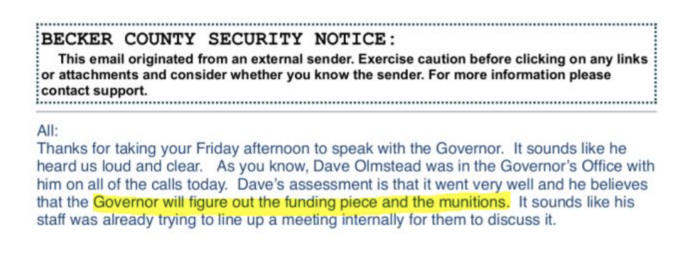
It should come as no surprise that two of the biggest recipients of this law enforcement funding were the Minnesota State Patrol (MSP), and the DNR. The subsequent approval of pipeline permits by DNR constituted a major conflict of interest.
This isn’t a single-issue critique though. Walz’s record on political issues beyond Line 3 deserves further scrutiny as well. The distressing lean into state-sponsored violence and oppression we witnessed around Line 3 was echoed during other pivotal moments during Walz’s tenure as Governor. For example, in 2020, the Minnesota State Patrol and DNR law enforcement officers invaded Minneapolis, along with the Minnesota National Guard, at the behest of Walz in order to crack down on the racial justice uprising following the murder of George Floyd by Minneapolis Police. Along with Minneapolis police, they exhibited violent behavior while specifically targeting journalists and medics. This violence was reflected in Walz’s disturbingly authoritarian rhetoric:
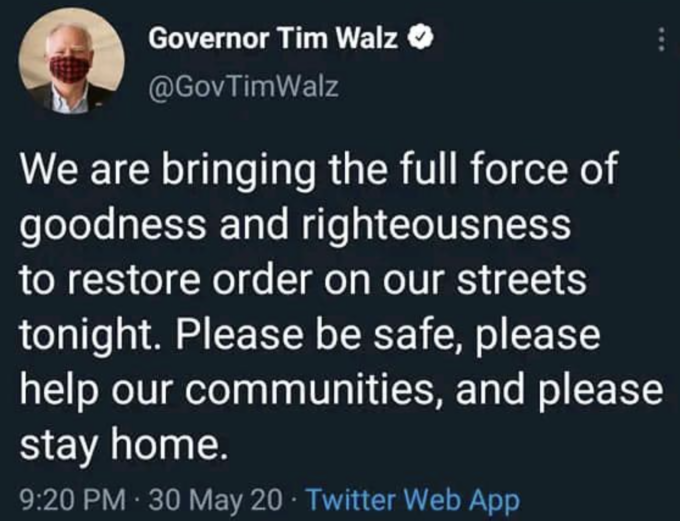
In 2021, Walz had the Minnesota State Patrol join Brooklyn Center police in aggressively deploying chemical weapons and munitions near the homes of families in Brooklyn Park, Minnesota to violently suppress protesters after the police murdered Daunte Wright. Walz once again looked to his former colleagues at the Minnesota National Guard and verbally retaliated against working class union members for not allowing the military members and humvees at their Union Hall in St. Paul:
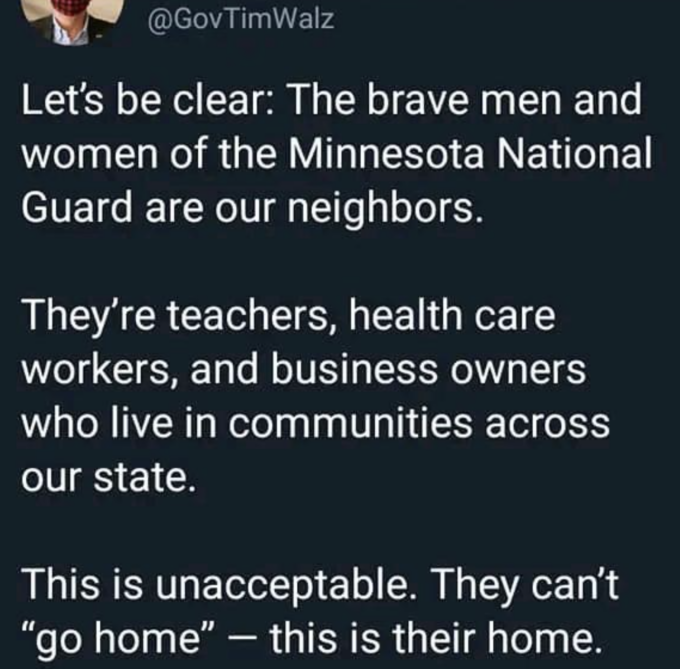
This also wasn’t the only time Walz went against the labor movement. During the 2022 Minneapolis Teachers strike, he turned his back on them, not supporting the strike despite himself being a former teacher, and later coordinating with management. Then in 2023, he exempted the State’s largest hospital from union-backed nurse staffing and safety legislation. Finally, in 2024, Walz vetoed legislation that would have raised the minimum wage for rideshare drivers.
In 2020, Walz loosened COVID-19 restrictions in Minnesota too early, before the curve was flattened, and failed to implement adequate measures to mitigate the second wave of COVID later in the year and into the following years. Conveniently, Line 3 oil pipeline workers were exempt from COVID restrictions to begin with. Like most of the Democratic party, Walz also supports the U.S. arming Israel with billions of dollars in weapons, even as the Israeli military carries out a genocide in Gaza.
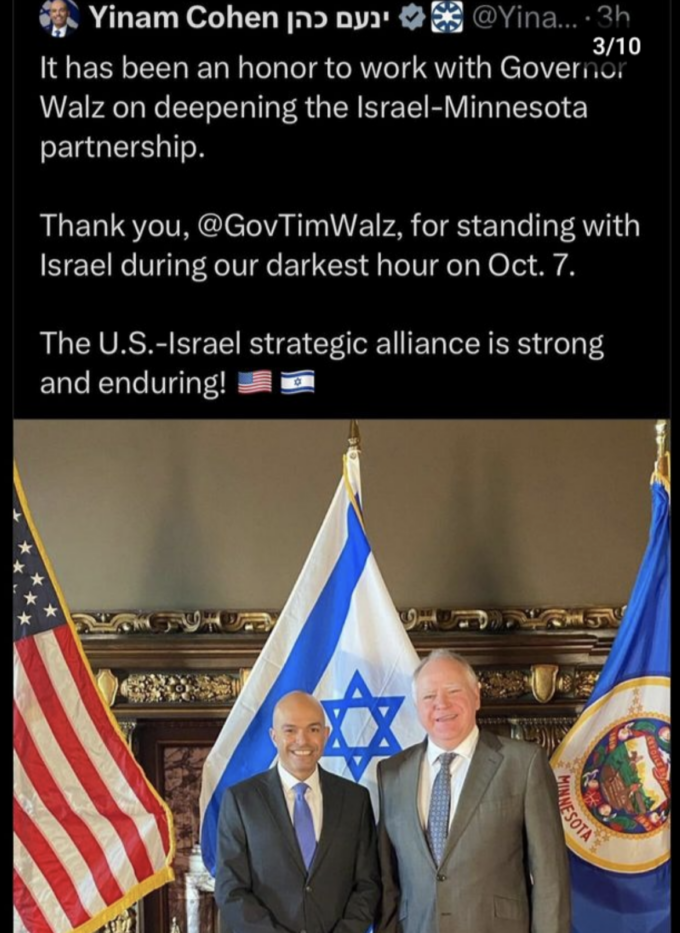
A year into Walz’s second term as Governor in 2023, Democrats won full party control of all three houses of state government for only the second time in 30 years. With this momentum, organizers, state reps and senators worked incredibly hard and built upon years of community organizing to have an historic session where they passed bill after progressive bill. Walz did sign most of these bills, but the reframing of Walz as a progressive champion is a rewrite of the history of incredible work done by frontline communities and locally elected representatives to move a progressive agenda through the statehouse.
Furthermore, a coalition of Minnesota environmental groups recently called out the Walz administration for their lack of action of environmental justice issues, and specified many examples on their web page: https://peoplenotpolluters.com/
Undoubtedly, our democracy is facing a crisis, up against the ever-looming embodied specter of fascism promoted by Trump, and also, as ever, against the pillars of systemic racial, economic, and environmental injustice on which this country has historically been built. But should elections be fundamentally about narratives and vibes? Does the truth matter? Who gets to tell it? If the only real power to affect social change comes from people power, we believe it is important to move forward collectively and strategically with an understanding of history, including the history of those in power and how they have interfaced with movements for social change. We need to know what we’re up against, so we can determine how best to deploy our own power.
So if this is our telling of how we have observed Tim Walz in relation to social movements, what does it mean? We believe it means that Walz, like most major Democratic party candidates, is unlikely to lead the way towards progressive victories, especially if it requires taking political risk or putting some skin in the game. Regarding the existential crisis of climate change, Walz is emblematic of most Democratic leaders who might take two steps forward with renewable energy legislation only to take more than two steps backward by greenlighting new fossil fuel projects. The pollution and climate impact of these projects continue to be borne disproportionately by black and brown people in this country and around the world. Likewise, Tim Walz and other Democrats are implicated and must be held responsible for state-sponsored repression of peaceful protestors by militarized law enforcement, as well as for their ongoing roles in U.S. support for military occupation and genocide around the world, such as the current massive genocidal attack against Palestine by the U.S. supported regime in Israel.
The connections among all of these phenomena are political institutions and leaders who continue to prioritize corporate wealth, resource extraction and imperialist control over social justice, environmental protection, and the rights of people to exist on their own lands. Changing this trajectory will require continued collective work by the grassroots communities and organizations. Politicians will not lead us through the portal into the world we want to live in. Our work is to make our demands for a better world into reality.
This piece is published in collaboration with Science for the People.
Science for the People Twin Cities is a radical organization that sees science, society, and power as intimately and inherently linked. Radical means going to the root of, and examining the structures, assumptions, and power relationships in all areas, so that what is, or what has been, need not determine what will be. We aim to challenge the status quo within the science establishment and society at large. We seek to join in solidarity with local and regional community and social movements, and participate in the international Science For The People Movement. Our members work at the intersection of our personal, political, and professional identities. We welcome the active participation of all people committed to imagining and building just and sustainable futures.